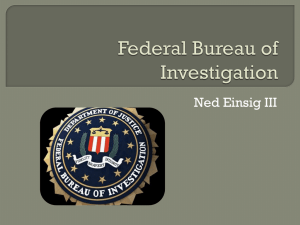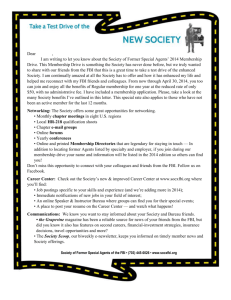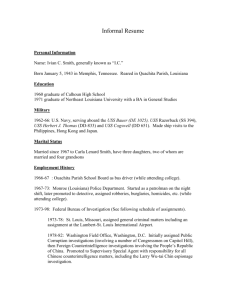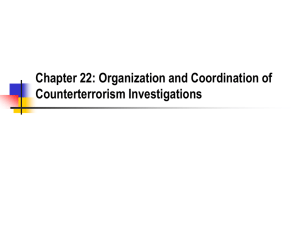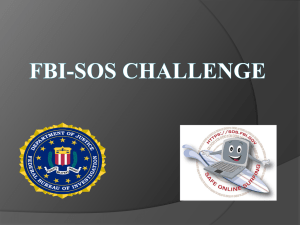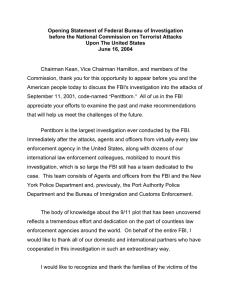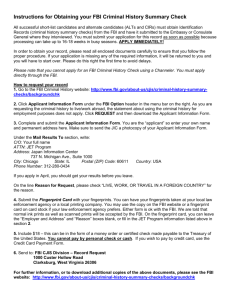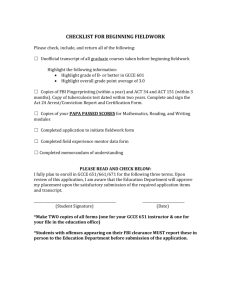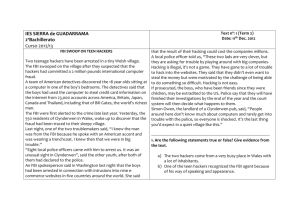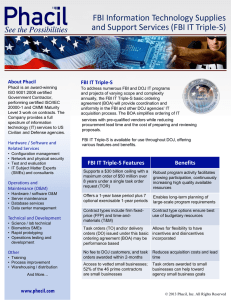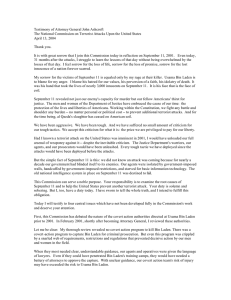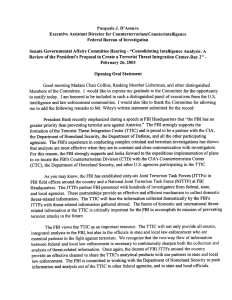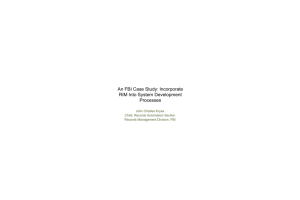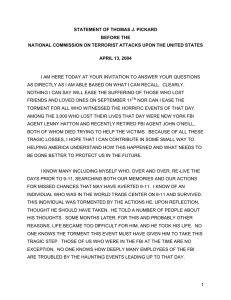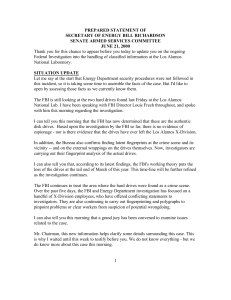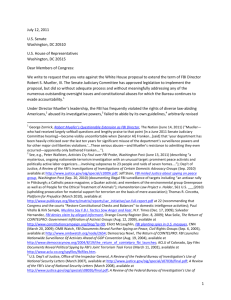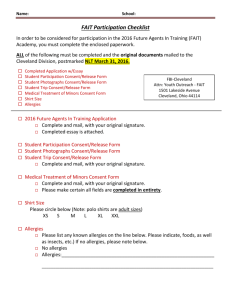Information Paper: Strategic Partnership — Academic
advertisement
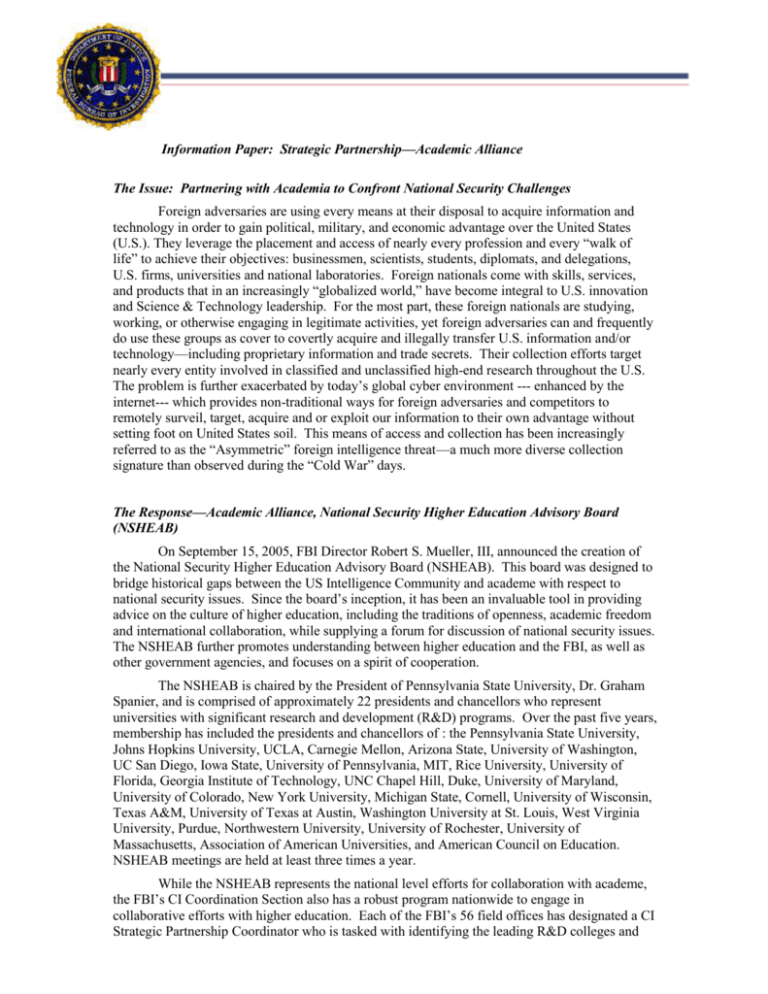
In Information Paper: Strategic Partnership—Academic Alliance The Issue: Partnering with Academia to Confront National Security Challenges Foreign adversaries are using every means at their disposal to acquire information and technology in order to gain political, military, and economic advantage over the United States (U.S.). They leverage the placement and access of nearly every profession and every “walk of life” to achieve their objectives: businessmen, scientists, students, diplomats, and delegations, U.S. firms, universities and national laboratories. Foreign nationals come with skills, services, and products that in an increasingly “globalized world,” have become integral to U.S. innovation and Science & Technology leadership. For the most part, these foreign nationals are studying, working, or otherwise engaging in legitimate activities, yet foreign adversaries can and frequently do use these groups as cover to covertly acquire and illegally transfer U.S. information and/or technology—including proprietary information and trade secrets. Their collection efforts target nearly every entity involved in classified and unclassified high-end research throughout the U.S. The problem is further exacerbated by today’s global cyber environment --- enhanced by the internet--- which provides non-traditional ways for foreign adversaries and competitors to remotely surveil, target, acquire and or exploit our information to their own advantage without setting foot on United States soil. This means of access and collection has been increasingly referred to as the “Asymmetric” foreign intelligence threat—a much more diverse collection signature than observed during the “Cold War” days. The Response—Academic Alliance, National Security Higher Education Advisory Board (NSHEAB) On September 15, 2005, FBI Director Robert S. Mueller, III, announced the creation of the National Security Higher Education Advisory Board (NSHEAB). This board was designed to bridge historical gaps between the US Intelligence Community and academe with respect to national security issues. Since the board’s inception, it has been an invaluable tool in providing advice on the culture of higher education, including the traditions of openness, academic freedom and international collaboration, while supplying a forum for discussion of national security issues. The NSHEAB further promotes understanding between higher education and the FBI, as well as other government agencies, and focuses on a spirit of cooperation. The NSHEAB is chaired by the President of Pennsylvania State University, Dr. Graham Spanier, and is comprised of approximately 22 presidents and chancellors who represent universities with significant research and development (R&D) programs. Over the past five years, membership has included the presidents and chancellors of : the Pennsylvania State University, Johns Hopkins University, UCLA, Carnegie Mellon, Arizona State, University of Washington, UC San Diego, Iowa State, University of Pennsylvania, MIT, Rice University, University of Florida, Georgia Institute of Technology, UNC Chapel Hill, Duke, University of Maryland, University of Colorado, New York University, Michigan State, Cornell, University of Wisconsin, Texas A&M, University of Texas at Austin, Washington University at St. Louis, West Virginia University, Purdue, Northwestern University, University of Rochester, University of Massachusetts, Association of American Universities, and American Council on Education. NSHEAB meetings are held at least three times a year. While the NSHEAB represents the national level efforts for collaboration with academe, the FBI’s CI Coordination Section also has a robust program nationwide to engage in collaborative efforts with higher education. Each of the FBI’s 56 field offices has designated a CI Strategic Partnership Coordinator who is tasked with identifying the leading R&D colleges and universities within their field offices’ area of responsibility. The mission of the NSHEAB and the CI Strategic Partnership Coordinators is multi-faceted and includes the following: - To open the doors of understanding and cooperation with leaders in higher education on matters relating to national security, terrorism, counterintelligence, and certain criminal matters. - To serve as a conduit for discussion between relevant federal agencies and the higher education community. - To assist in understanding the unique culture, traditions, and practices of higher education, including the culture of openness, academic freedom, and the importance of international collaboration. - To develop educational efforts for higher education to better understand the missions and mandates relating to terrorism, counterintelligence, and homeland security. - To advise on the development of an agenda for research that can facilitate national security. - To discuss matters pertaining to visas, foreign students, international visitors, and technology and intellectual property export issues. - To serve as a liaison with higher education associations to broaden understanding and cooperation. - To facilitate the development of research, degree programs, course work, internships, employment opportunities for graduates, and consulting opportunities for faculty related to national security. Creating a stronger defensive posture across the private sector in this regard has led to the early intervention by the FBI, in pursuing offensive operational and intelligence collection opportunities at the intersection of threats, vulnerabilities and criticality of equities around the nation. To date, the program’s achievements in information sharing, outreach and collaboration stand in stark contrast to the insular and reactive approaches of the past. The Academic Alliance is netting definitive results in anticipating and “hardening” targets before incursions happen, and in developing new intelligence. The Future: Higher Education’s Enhanced Awareness of National Security Issues While the FBI continues to make progress in opening lines of communication with those who may be vulnerable to intelligence threats in our academic community, the FBI must place greater emphasis in changing the behavior of our adversaries through a more sophisticated approach in intelligence collection and analysis. FBI will develop the capabilities to correctly anticipate future conditions, focus our assets, and shape the Domain accordingly. Predictive Domain Awareness will achieve, through intelligence collection and careful analysis, a common operating picture and level of awareness that enables the FBI and its partners to drive the adversary to a course of action that is preferred, if not dictated by the FBI. This gives the USIC a decisive operational advantage going forward. The collaborative partnership established with higher education is a key component in the FBI’s strategy of staying ahead of national security threats through predictive, proactive and preventive engagement. Point of Contact: CI Strategic Partnership Unit, CD-6A: Unit Chief Mark A. Levett, SSA Thomas P. Weldon III

